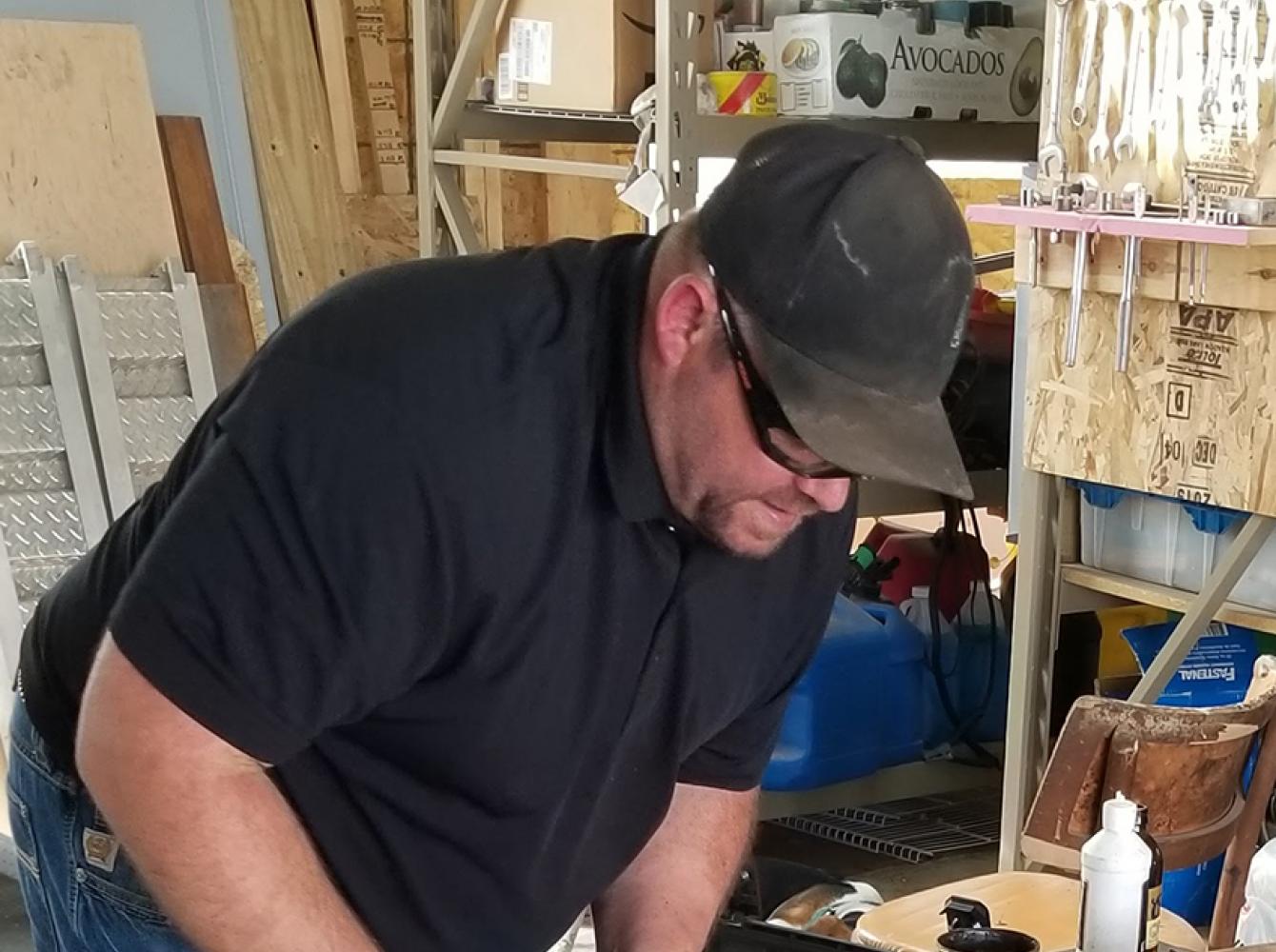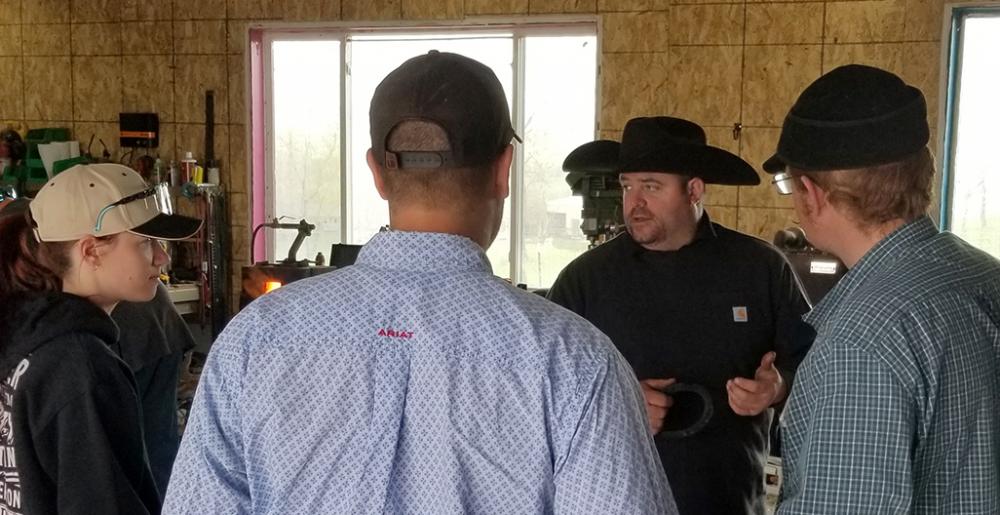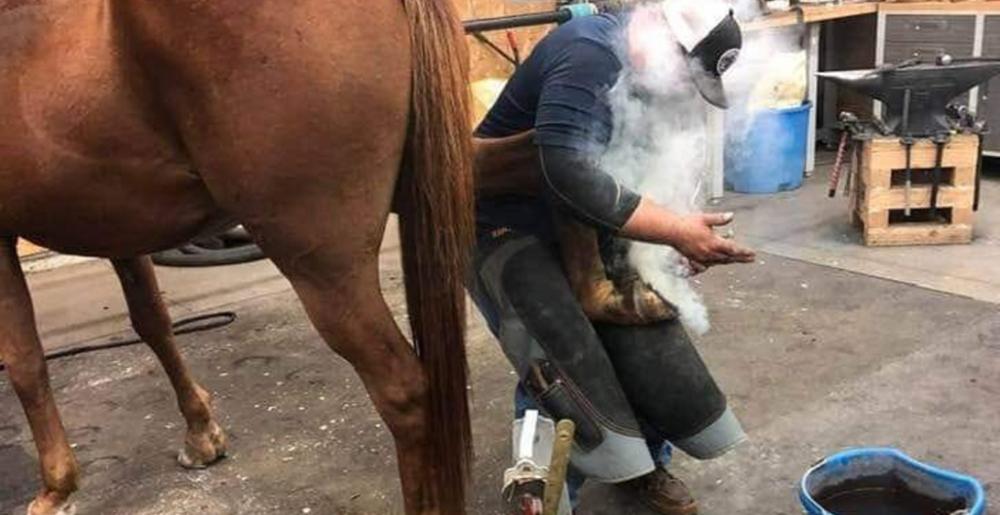
Jake Stonefield, CJF
Jake has seen first hand the benefits of clinics and learning. He didn’t want to keep them to himself.
High Plains, High Standards
Some people do their jobs well. Others do their jobs so well that they inspire others.
Jake Stonefield is the latter.
After some years as a steelworker on large construction projects across the Midwest, he decided he wanted to work a little closer to home—and spend more time with his family. So this horse owner attended farrier school in Arizona before opening shop in a town of 114 in South Dakota, about 90 miles north of Sioux Falls.
So far, so good: a nice business with a focus on the quarter horses which are popular in the area. And he could have been very happy just staying the course.
Except that he couldn’t.

From Learning To Earning
While he started as a farrier, he’s become a catalyst. When, about five years after he hung his shingle, he started going to clinics, he saw his business take off. “If you go to clinics, people have faith in you, they know you’re competent because you’re still learning. I think it’s one reason I’ve been fortunate to work on high-value horses.”
Clinics are especially important for high plains farriers. Even by horse country standards, it’s a sparsely populated region that he describes as “four hours from anywhere.”
Not coincidentally, Stonefield met Mustad’s Midwest Rep, Michael Seaton, at a clinic in Valley, Nebraska, and often runs into him at other events. It’s one of the many such connections he’s made, and he especially appreciates Michael’s product knowledge. “He introduced me to the Mustad St. Croix Forge CrossOver shoe, which I now use on four or five horses a day.”
What You Do When No One’s Looking
While he could have kept his growing knowledge to himself, he became a champion of clinics. He also started working with North Dakota-based farrier, Allan Voeller, the pair striving to get their CJF certification together.
With their certifications completed, Stonefield and Voeller formed the High Plains Farrier Association, which brings together farriers in North Dakota, South Dakota, and surrounding areas in IA, MN, NE, WY, and MT. Stonefield is President of the group, which exchanges tips and photos on Facebook, holds monthly hammer-ins, and points members to contests, clinics, and other opportunities. Despite the sometimes long travel times for meetings, the association built a real camaraderie between farriers, emphasizing mentorship and continual learning.
Jake summed up the association’s reason for being: “Are we as an industry trying to improve ourselves when no one is looking?”
After visiting a gathering sponsored by the association, VP Voeller called the experience, “The cheapest education you’ll ever get! There’s well over 200 plus years of experience in this shop!”
Another member’s social media post captured the group’s energy: “Working hard with our manufacturers and companies to bring in resources and clinicians to the area. Excited for the future.”
Bringing It All Back Home
Of course, everything began with his drive to improve his own business. And he always comes back to that.
One example is his mastery of making his own shoes. Though he needs to do so infrequently, aside from bar shoes, he still hones the skill, saying “If you understand how to make shoes, you can do just about anything with nothing.”
Continuous improvement hasn’t just attracted customers. It has helped retain them. “When customers know you’re always improving, they stay with you,” he said.

When Stonefield realized the costs of traveling 250 miles a day to customers, he set up his own facility and had them come to him. Naturally, he was afraid that his clients would leave, so he carefully calculated how many he could lose and still be profitable. He didn’t lose any. “I still have three clients that were some of the very first people I worked for. Without those ladies, I probably wouldn’t be here.”
The benefits weren’t all monetary. “I can play catch with my son or take my daughter to school.”
The Feel Of The Steel
He’s continued to fine-tune his business—asking clients to commit to a six-week schedule, to ensure optimal hoof care for the horses and reliable income for himself. He addresses supply issues by ordering everything in bulk early in the season. That way, he’s not having to place emergency orders during busy season. Mustad is proud to be in his barn.
He chooses products that work with the soft-black dirt of the High Plains. He uses Mustad Equi-Libriums for event horses and the occasional Delta Challenger TS8. St. Croix Forge CrossOvers and Advantages are his go-to because “I can do just about anything I need with those.”

St. Croix Forge Crossover front & Mustad Equi-Librium front
The Heller Legend white tang rasp has been his go-to for years because it fits his hands and cleans well, even when prairie dirt becomes prairie muck.
His preference for Mustad goes beyond any individual project. He appreciates the American-made quality. “The flag on the box makes a difference to my customers.”
Ultimately, this is a business where you spend a lot of time with a small piece of metal. “I just like the feel of the steel in Mustad products.”